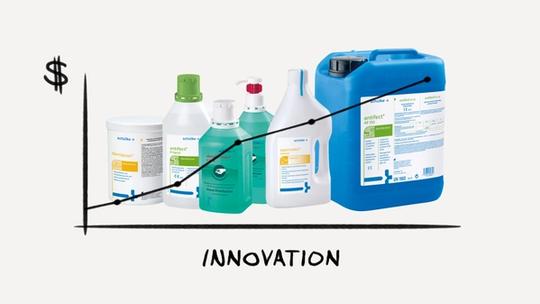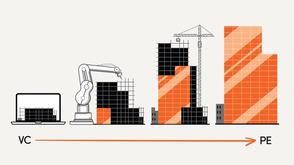Hand Sanitizer and Passenger Ferries: How Private Capital Creates Value


Repositioning a century-old industrial conglomerate and a leading Nordic ferry operator required a laser focus on ways to grow established businesses
- Strategically repositioning and future-proofing companies is a trademark move for the private capital industry
Schülke, the German maker of hand sanitizers, wound sprays and other infection prevention solutions, had been on EQT’s radar before the Covid-19 pandemic in 2020 triggered a surge in demand for similar products. While the temptation to do nothing with a suddenly thriving business might have appealed, EQT’s deal team already had a plan in place to reposition the firm after it was carved out of chemicals conglomerate Air Liquide.
Those plans delivered double digit annual revenue growth and almost doubled EBITDA (a common measurement of performance and profitability) in its core healthcare business during the period under EQT’s ownership.
Strategically repositioning and future-proofing companies is a trademark move for the private capital industry. Whereas a public company listed on the stock market is held accountable to its shareholders every quarter, private capital’s investment model allows for a long-term approach.
As a result, they can invest in portfolio companies and develop them with an undiluted focus on the long-term success of those businesses and make the required investments, even if that comes with temporary lower profitability in the next quarter.
Analysis of EQT’s private capital portfolios has found that the single largest creator of value is growing a company’s sales, a strategy that sometimes requires refocusing a firm’s operations and challenging the status quo to maximize growth.
“You start at the end and work your way backward, thinking what do we want to create in four or five years’ time and what steps do you need to take to get there?”
In the case of Schülke, this is exactly what happened following the strategic repositioning. The business emerged leaner, more focused and thus more attractive to buyers after three years under EQT ownership.
“You start at the end and work your way backward, thinking what do we want to create in four or five years’ time and what steps do you need to take to get there?” explained EQT Managing Director Simon Tillmo, who helped shepherd Schülke.
Schülke, which was sold to a consortium led by the single-family office ATHOS, is an example of how private capital ownership can turn a good business into a better, more focused and more valuable one.
EQT was not swayed from its transformation plan by the impact of the pandemic.
We wanted to focus the business and free up capacity and mind space to concentrate on what’s really attractive and going well,’” said Tillmo, referring to the core healthcare division, which provides disinfectants and antiseptic products to the professional healthcare industry such as hospitals and pharmaceutical providers as well as to consumers via pharmacies or a direct patient care business.
The Benefit of Focus: Cleaning up Schülke
With the business standing on its own two feet after the acquisition, the company’s needs were clearer. The first priority was to focus on its core business of infection prevention.
The Personal Care division, which produced additives and preservatives for the cosmetics industry, was duly sold within the first six months and the former Industrial Hygiene business was focused on pharmaceutical customers.
Schülke was now a company with a clearer focus, and could turn its attention to growth: through acquisitions in Germany, Spain and the Nordics, it both extended its geographical reach and improved its distribution in key markets, among other things by opening up a new digital distribution channel.
Another focus was investment in innovation and the development of new sustainable product lines, including a biodegradable antiseptic wipe, the first such product to be made available at scale for Europe’s hospitals.
This transformation was supported by EQT’s Troika model, in which the portfolio company chairperson, CEO and the responsible deal partner from EQT work closely together in an informal setting to drive change.
“In this case, the Troika was probably even more active than it typically is given the amount of initiatives ongoing at the same time,” recalled Matthias Wittkowski, responsible partner on the deal. “We had meetings at least every two weeks and would sit down for a couple of hours and talk about ongoing initiatives, ensure that we all were aligned and how we as owners could support the management team across them.”
Board members also played an active role in the transformation. They were assigned clear responsibilities based on prior experiences and became natural sparring partners in those areas to the specific members of the management team.
The upshot was a more streamlined, international and ultimately valuable company: “When we bought the business, the focus wasn’t clear; it was a bit of healthcare, a bit of industrials, a bit of chemical,” Wittkowski said. “The changes we did opened up the buyer field when it was time to sell Schülke and create something which had high strategic value.” The firm was sold in 2023.
The Power of Capital and Connections: Rerouting Nordic Ferries
While Schülke was an example of a plan that was clear from the beginning, sometimes investments steer a different course. So it was with the companies that became Nordic Ferry Infrastructure (NFI), a group that combined two passenger ferry operators, the Norwegian firm Torghatten and Denmark’s Molslinjen.
Stockholm-based EQT was drawn to the passenger ferry industry by the essential nature of the ferry infrastructure in the Nordic region and its obvious need for capital. The sector was undergoing the capital-intensive transition from diesel fuel to electric power and other green fuel alternatives. EQT identified Torghatten and Molslinjen as investment opportunities, and both were acquired separately in early 2021.
“These investments have a useful life spanning several decades. So if you cannot price the value of that over the long-term, you will not be able to make the necessary investment to support the green transition.”
At this stage, a combination was not planned, but the benefits of combining the two companies soon became clear. Both companies had debt that needed to be refinanced, and a joint structure meant this could be done on more competitive terms. The combined entity also made procurement more efficient; for example, it brought together the best technicians from both companies to work on product development, and it made insurance more cost-effective.
If the first advantage of private capital ownership is that it can drive change such as this, seeing a company through fresh eyes and injecting it with new energy, the second is the depth of resources it can access to help deliver the plan.
EQT leveraged its access to capital markets to source the capital needed to support NFI’s overhaul. “We have teams that help support our companies by offering access to capital markets via relationships that go back many years,” said Parham Abuhamzeh, a Managing Director in the EQT Infrastructure Team.
Following the combination, EQT was able to help NFI raise a sustainability-linked loan from a consortium of 14 European banks, giving the business firepower for the up-front investments required for a major decarbonization effort.
Alongside improved access to capital came access to experienced management executives. With the new combined structure came a new approach to governance, led by a group chief executive officer and group chief financial officer. To support and help drive the transition to a group governance model, EQT tapped its network of industrial advisers, appointing Niels Smedegaard, an experienced former CEO in the industry who had consulted on the original deals, as group chairperson.
Strengthening portfolio company leadership teams is a standard process in a private capital deal. Managers like EQT often handle the search on behalf of portfolio companies, using their own network and experience of filling senior roles to ensure a company gets the best out of an executive search process.
NFI now continues to invest significantly into its long-term sustainable growth with further capital expenditure. One example is the ongoing electrification of operations in Denmark. “The transport sector, including ferry transport, represents a meaningful part of overall carbon dioxide emissions in Denmark,” Abuhamzeh explained.
“Ferries that burn marine gas oil produce hundreds of thousands of tons of carbon dioxide every year. As part of our ongoing decarbonization strategy, we are undergoing preparations to electrify significant parts of operations, with electrification projects requiring significant investment, even with support from various governmental schemes.”
It will also, he said, have a long-term impact. “These investments have a useful life spanning several decades. So if you cannot price the value of that over the long-term, you will not be able to make the necessary investment to support the green transition.”
In other words, it takes an owner with a very long-term outlook and access to long-term capital to make green investments such as these, which will transform the prospects of a business and, in doing so, create value for shareholders.
It is exactly this willingness to think ambitiously, working with deep pockets and a long time horizon, that sets private capital apart and gives it a repeatable formula to create value.
ThinQ by EQT: A publication where private markets meet open minds. Join the conversation – [email protected]





